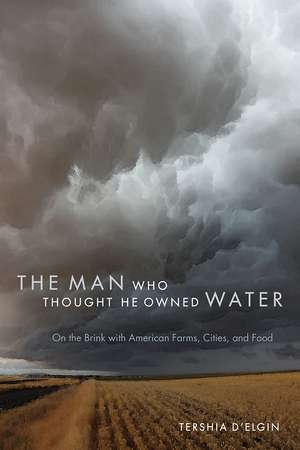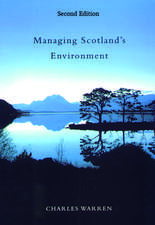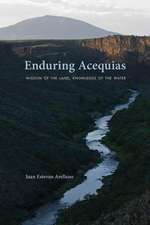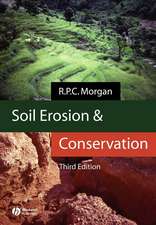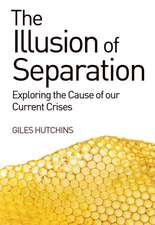The Man Who Thought He Owned Water: On the Brink with American Farms, Cities, and Food
Autor Tershia d'Elginen Limba Engleză Paperback – 14 aug 2016 – vârsta ani
The Man Who Thought He Owned Water is author Tershia d’Elgin’s fresh take on the gravest challenge of our time—how to support urbanization without killing ourselves in the process. The gritty story of her family’s experience with water rights on its Colorado farm provides essential background about American farms, food, and water administration in the West in the context of growing cities and climate change. Enchanting and informative, The Man Who Thought He Owned Water is an appeal for urban-rural cooperation over water and resiliency.
When her father bought his farm—Big Bend Station—he also bought the ample water rights associated with the land and the South Platte River, confident that he had secured the necessary resources for a successful endeavor. Yet water immediately proved fickle, hard to defend, and sometimes dangerous. Eventually those rights were curtailed without compensation. Through her family’s story, d’Elgin dramatically frames the personal-scale implications of water competition, revealing how water deals, infrastructure, transport, and management create economic growth but also sever human connections to Earth’s most vital resource. She shows how water flows to cities at the expense of American-grown food, as rural land turns to desert, wildlife starves, the environment degrades, and climate change intensifies.
Depicting deep love, obsession, and breathtaking landscape, The Man Who Thought He Owned Water is an impassioned call to rebalance our relationship with water. It will be of great interest to anyone seeking to understand the complex forces affecting water resources, food supply, food security, and biodiversity in America.
When her father bought his farm—Big Bend Station—he also bought the ample water rights associated with the land and the South Platte River, confident that he had secured the necessary resources for a successful endeavor. Yet water immediately proved fickle, hard to defend, and sometimes dangerous. Eventually those rights were curtailed without compensation. Through her family’s story, d’Elgin dramatically frames the personal-scale implications of water competition, revealing how water deals, infrastructure, transport, and management create economic growth but also sever human connections to Earth’s most vital resource. She shows how water flows to cities at the expense of American-grown food, as rural land turns to desert, wildlife starves, the environment degrades, and climate change intensifies.
Depicting deep love, obsession, and breathtaking landscape, The Man Who Thought He Owned Water is an impassioned call to rebalance our relationship with water. It will be of great interest to anyone seeking to understand the complex forces affecting water resources, food supply, food security, and biodiversity in America.
Preț: 184.65 lei
Nou
Puncte Express: 277
Preț estimativ în valută:
35.34€ • 38.40$ • 29.71£
35.34€ • 38.40$ • 29.71£
Carte disponibilă
Livrare economică 31 martie-14 aprilie
Preluare comenzi: 021 569.72.76
Specificații
ISBN-13: 9781607324959
ISBN-10: 1607324954
Pagini: 288
Ilustrații: 18 figures
Dimensiuni: 152 x 229 x 25 mm
Greutate: 0.36 kg
Ediția:1
Editura: University Press of Colorado
Colecția University Press of Colorado
ISBN-10: 1607324954
Pagini: 288
Ilustrații: 18 figures
Dimensiuni: 152 x 229 x 25 mm
Greutate: 0.36 kg
Ediția:1
Editura: University Press of Colorado
Colecția University Press of Colorado
Recenzii
“If Gabriel García Márquez had been born on a ranch along the South Platte River, where water disputes sometimes lead to a bullet to the brain, and where greedy suburbs, feedlots and oil frackers conspire to turn Colorado grasslands to desert, this is the book he would’ve written. The surreal postscript and dirge for the little house on the prairie.”
–Mike Davis, political activist, urban theorist, and author of Ecology of Fear and City of Quartz
“This is the best book I’ve read since Major John Wesley Powell’s epic work over a century ago, on why the American West will always thirst for water. Using her own pioneering family history in Colorado, d'Elgin weaves past and present into a personal memoir that is touching, funny, and prescient of what’s to come. Anyone concerned about our national drought and the fallout on our food and where it comes from must read this book.”
—Betty Harper Fussell, writer and food historian
“The global water crisis is upon us. D’Elgin has taken that crisis and personalized it into a compelling story of greed, bad governance, and horrible water management practices to be sure, but also of sacrifice, hope, and love. A wonderful book.”
—Maude Barlow, co-founder of the Blue Planet Project and chair of the board for Food & Water Watch
“This is the best book I’ve read since Major John Wesley Powell’s epic work over a century ago, on why the American West will always thirst for water. Using her own pioneering family history in Colorado, d'Elgin weaves past and present into a personal memoir that is touching, funny, and prescient of what’s to come. Anyone concerned about our national drought and the fallout on our food and where it comes from must read this book.”
—Betty Harper Fussell, writer and food historian
“The global water crisis is upon us. D’Elgin has taken that crisis and personalized it into a compelling story of greed, bad governance, and horrible water management practices to be sure, but also of sacrifice, hope, and love. A wonderful book.”
—Maude Barlow, co-founder of the Blue Planet Project and chair of the board for Food & Water Watch
"The Man Who Thought He Owned Water, an unusual family memoir cum ecological treatise, brings home the complications of water scarcity."
—Foreword Reviews
"A compelling biographical account. . . . d'Elgin's narrative makes engaging reading, and her insight into Colorado's water issues is important. . . . This is a book that I highly recommend."
—Colorado Central Magazine
"[A] must read for all of us water consumers who once fantasized that Colorado would never change."
—Valley Courier
"[A] well-written defense of rural life and a plea for readers to take seriously the interconnectedness between cities and farms."
—Journal of Historical Geography
"With lovely descriptions, poetic reflection, and absurdly funny, intimate expression, D’Elgin draws you into each fold of this epic family history."
—Civil Eats
"[This] sometimes funny, often impassioned, highly personal chronicle of [d'Elgin's] family’s experience running an irrigated farm in northeastern Colorado. . . . painstakingly recap[s] the area’s early historical settlement and the convoluted legalese that came to rule over water appropriation, and does it in such a way that makes the tale surprisingly comprehensible for a general audience."
—AG Journal
"Tershia d'Elgin's book is lucidly written, combining the personal story of her family's history and a well-researched examination of how water laws work and how they can be changed."
—Water and Power Associates
—Foreword Reviews
"A compelling biographical account. . . . d'Elgin's narrative makes engaging reading, and her insight into Colorado's water issues is important. . . . This is a book that I highly recommend."
—Colorado Central Magazine
"[A] must read for all of us water consumers who once fantasized that Colorado would never change."
—Valley Courier
"[A] well-written defense of rural life and a plea for readers to take seriously the interconnectedness between cities and farms."
—Journal of Historical Geography
"With lovely descriptions, poetic reflection, and absurdly funny, intimate expression, D’Elgin draws you into each fold of this epic family history."
—Civil Eats
"[This] sometimes funny, often impassioned, highly personal chronicle of [d'Elgin's] family’s experience running an irrigated farm in northeastern Colorado. . . . painstakingly recap[s] the area’s early historical settlement and the convoluted legalese that came to rule over water appropriation, and does it in such a way that makes the tale surprisingly comprehensible for a general audience."
—AG Journal
"Tershia d'Elgin's book is lucidly written, combining the personal story of her family's history and a well-researched examination of how water laws work and how they can be changed."
—Water and Power Associates
Notă biografică
Tershia d’Elgin is a social activist with deep Colorado roots and a special interest in water policy, water conservation, and the tension between agricultural and metropolitan claims on water. A San Diego-based writer and water resources consultant, she also oversees a working farm on the South Platte River in Colorado with her family.
